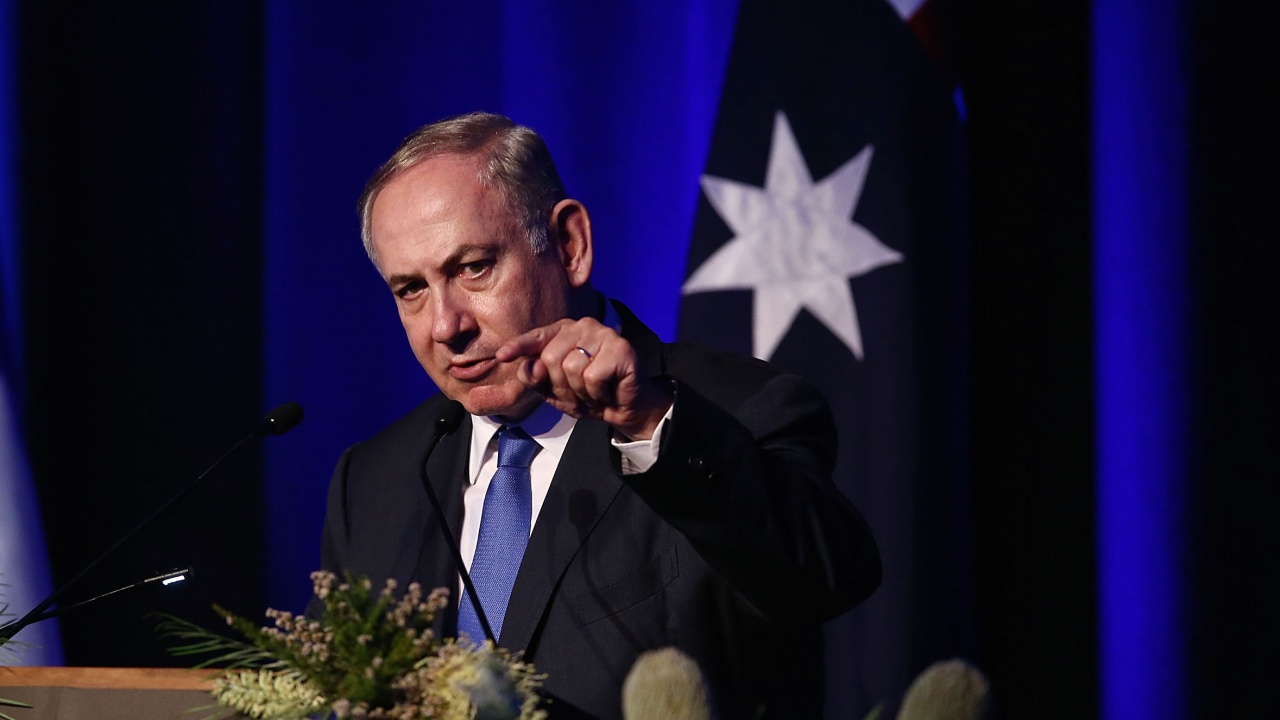Israeli Prime Minister Benjamin Netanyahu has announced that he is postponing the adoption of his landmark justice reform, the Guardian wrote.
The British publication noted that the prime minister of the Jewish state has postponed his controversial proposals for justice changes until the next parliamentary session as a result of the mass protests that have swept the country.
The Guardian pointed out that the embattled head of the executive branch announced the delay by his far-right government in pushing through the reform after 12 weeks of an ever-escalating political crisis.
The newspaper added that when announcing the news in a televised address to the nation last night, the Israeli prime minister appeared exhausted and spoke with an unusually flat intonation, and quoted his words from the address in which he motivated the postponement of the reform: "I don't want the country to collapse. As soon as there is opportunity to avoid a fratricidal war through dialogue, I as Prime Minister will temporarily postpone my intentions to give way to dialogue."
The Israeli Prime Minister postpones the controversial justice reform after mass protests, another British daily - "Independent" - reported in a headline on the subject.
The media commented that the delay in adopting the controversial changes in Israeli society will calm tensions in Israel and give Netanyahu some time to reach a compromise with his political opponents.
But if adoption of the reform is delayed too long, he risks angering his hardline partners in the ruling coalition such as Homeland Security Minister and leader of the far-right Jewish Power religious party Itamar Ben-Gvir.
This, in turn, would threaten the stability of the cabinet and hide the danger of new elections, the newspaper commented.
Any new elections will inevitably once again become a referendum on whether Netanyahu is fit to rule, the publication added.
The Israeli Prime Minister took a step back in his landmark reform after a day of chaos in Israel, writes the Daily Telegraph.
Q. The Washington Post also commented that Netanyahu was forced to give in to the wave of unprecedented strikes and protests, and noted in this regard that there was a threat that all life in the country would be paralyzed.
The American daily added in another article that Netanyahu's Israel has found kindred spirits in Hungary and Poland.
The author of the commentary, Ishan Tharoor, summarizes that the desire of Israel's ruling far-right coalition to reform the justice system in this way is inspired by the success of anti-liberal nationalists elsewhere, such as in these two Eastern European countries.
Q. "The New York Times" has a story on the subject in which it tells what the role of the US was in Netanyahu's decision yesterday by exerting increased pressure on him.
The article states that President Joe Biden
Joe Biden (Joseph Robin Biden) is an American politician. Joe Biden was born on November 20, 1942 in and his advisers have bombarded Israeli rulers with warnings that their actions are endangering the international reputation of the Middle Eastern country and endangering Israeli democracy.
On Sunday night, the White House released a statement, shortly after Netanyahu fired his defense minister over his anti-reform stance, noting that as recently as a week ago, Biden had told the Israeli prime minister in a phone call that democratic values "always have been and must to remain the main element in American-Israeli relations in the future".
Any large-scale changes in the system, the US president has indicated, "should be made only with the widest possible public support".
Such words are striking, because usually the standard position of the White House - both when it is a Democrat and when it is a Republican - is that Washington does not interfere in the domestic politics of its allies.
But this is not always true, notes the New York Times, and adds that the US intervenes constantly, but usually behind the scenes.
In this case, commented the publication, Biden and his advisers put aside all pretense and entered into an open confrontation with Netanyahu, although he claimed in his dialogue with representatives of the American government that he was a person of compromise.
Representatives of the Biden administration told the publication that the talks with the Netanyahu government were even more unceremonious than reported, a clear indication that according to Washington, Israel's reputation as the only democracy in the Middle East was at stake.
Q. The Wall Street Journal notes that the freeze on justice reform appears to have calmed tensions after protests and national strikes rocked Israel.
However, the American publication quoted political commentators, according to which if no compromise is reached on the issue in the meantime, the conflict could flare up again and even escalate even more.
"This looks more like a truce than an internal peace among Israelis," Yohanan Plesner, chairman of the Israel Democracy Institute think tank, said of Netanyahu's address last night.
"It is too early to say whether the crisis is over," he said.
Q. The Financial Times commented that in his address to the nation, the Israeli prime minister took a step back on reform, but made it clear he was not backing down completely, attacking protesters in Israel, saying the demonstrations were the work of an "extremist minority" trying to divide the country.
The British daily also quoted a statement by former Israeli Prime Minister Ehud Barak, who described the current crisis as the worst since the creation of Israel in 1948.
After the postponement of judicial reform: Protests in Israel do not subside
Benjamin Netanyahu
Joe Biden
